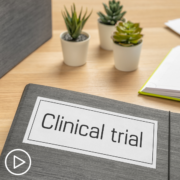AML Clinical Trials Critical to Treatment Breakthroughs and Improvements
AML Clinical Trials Critical to Treatment Breakthroughs and Improvements from Patient Empowerment Network on Vimeo.
Why are acute myeloid leukemia (AML) clinical trials so critical? Dr. Naval Daver from the University of Texas MD Anderson Cancer Center shares his perspective about clinical trials. Learn how clinical trials help both current and future AML patients.
[ACT]IVATION TIP from Dr. Daver: “Clinical trials are critical, both for the patients themselves to get access to what we call tomorrow’s medicine today as well as potentially to help move the entire field forward.”
Download Resource Guide en español
Related Resources:

|

What Promising AML Treatments Are Available for Newly Diagnosed Patients? |

|
Transcript:
Art:
Dr. Daver, what is the importance of clinical trial participation as it relates to breakthroughs in AML, and what advice do you have for AML patients considering a clinical trial?
Dr. Naval Daver: Clinical trials are critical for the progress that we have already seen an acute myeloid leukemia, the drugs that have been improved in the last six, seven years, including venetoclax (Venclexta), FLT3 inhibitors, midostaurin (Rydapt or Tauritmo), gilteritinib (Xospata), hopefully quizartinib other emerging targeted therapies…IDH1, IDH2 inhibitors, menin inhibitors, CD47 antibodies, we’ve learned about all of them and have got approvals and many of them through the ongoing clinical trials.
I think it’s very important for patients to realize that in most large academic centers, we will only participate in the clinical trial if we think it has the potential to improve the standard of care in the future. There’s very little incentive for academic investigators or clinical investigators, such as myself, we’re very, very busy to get involved in a trial if we don’t think that it has the potential to improve the outcome or change the nature of AML therapy in the future, so a lot of patients often ask me, Oh, I want the randomized or placebo arm. There is no real placebo alone in any AML study that I’m aware of, most of the studies will use standard of care, which is what you would’ve gotten wherever you were getting treatment at home, locally, community hospital versus a standard of care plus where the new drug will be added, whether it’s the FLT3 inhibitor, the CD47 antibody, the menin inhibitor
So there’s a good chance, 50 percent that you’re going to get standard of care plus that we think has the potential to improve the outcome, of course, you never know, that’s what you do, the trial, but we think based on the previous pre-clinical data to pass when the page to deliver this looks like it will improve the outcome for this molecular or site group versus standard of care, which is what you will have gotten.
So I think it’s important to realize that you will never get less on standard of care and any clinical trial, at least in the AML field, and at least in our experience that they understand.
Now, beyond that, there’s also a Phase I in two states, and those are the ones that we focus on quite a bit at MD Anderson, these are single arm studies, meaning everybody will get the investigational agent combo, so azacitidine (Onureg or Vidaza) and venetoclax (Venclexta), we were one of the first sites to work on and leave this study and all of our patients in 2015, 2016, we’re getting this regiment, it was not approved to much later in 2019, 2020, and for those three, four years, our patients, hundreds of patients were able to get that combination, which probably cured many, many more than would have been cured to the standard of care until, of course, I’ve got a pro four years later, but for an option, of course, you cannot wait four years, so I’m a huge believer in clinical trials, I think it’s really, really important, both for the patients themselves as well as for the field, for us to be able to move the entire AML field forward for the next decade, and I would very strongly consider looking at or discussing with your treating physician trial options, and then you can look at them on your own through clinicaltrials.gov, or other sites with leukema and lymphoma that give a lot of information on clinical trials.
So my activation tip related to this question is that I think clinical trials are critical, both for the patients themselves to get access to what we call tomorrow’s medicine today as well as potentially to help move the entire field forward, all of the clinical drug approvals in progress we have seen in AML in the last six, seven years have come through clinical trials that patients in the past have agreed to kindly participate and helped probably themselves by getting better medications and combinations, and definitely the field to move forward, so definitely a big proponent for clinical trials.










